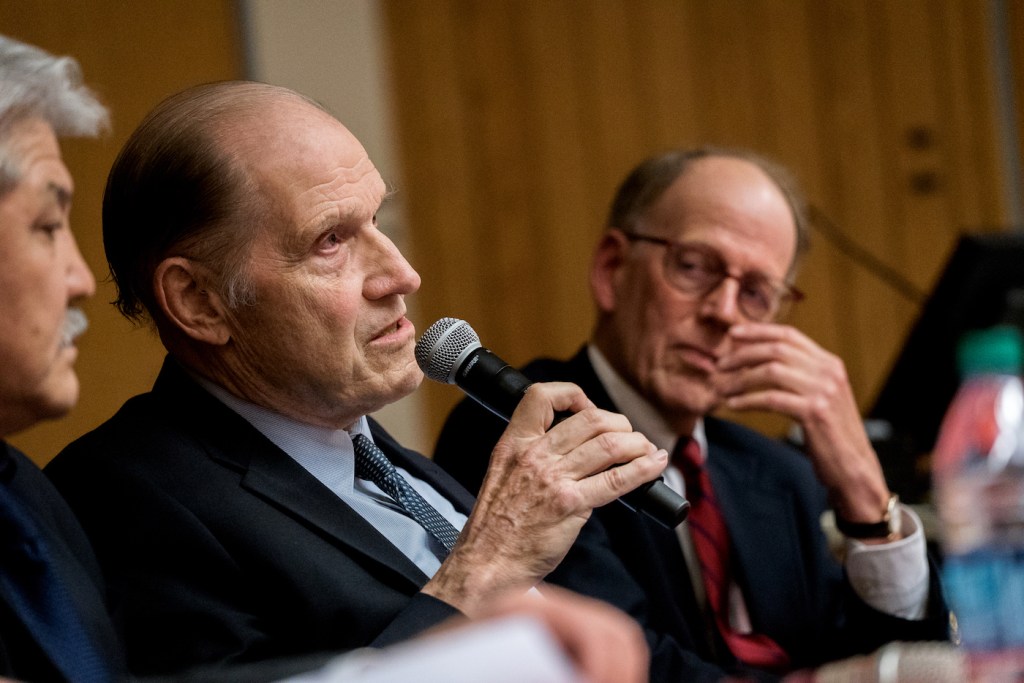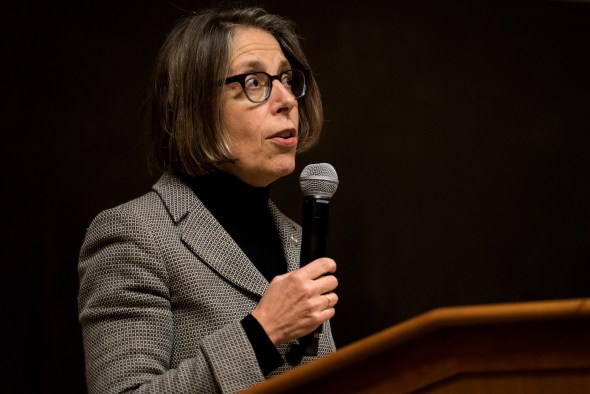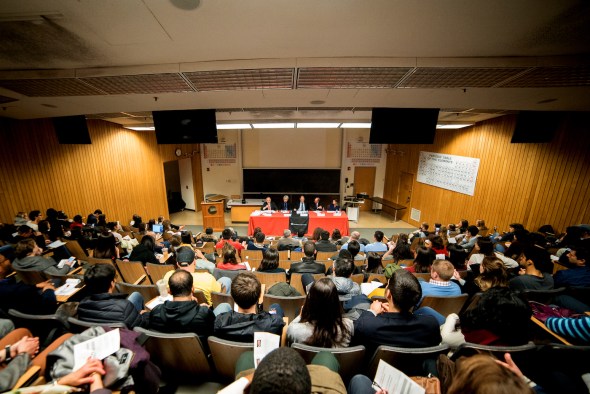Tweets, truth, and trust: Foreign diplomacy in the Trump era

“When does a world leader’s advent mark the beginning of an era?”
This was the question Mary Loeffelholz asked an audience of more than 200 students, faculty, staff, and alumni to kick off an event Wednesday night that examined diplomacy and international relations in Donald Trump’s presidency.
The panel discussion featured three faculty members, all of whom previously served as ambassadors, and a keynote address by prominent international relations expert Charles W. Greenleaf. Marissa Lombardi, director of the Master’s Program in Global Studies and International Relations, moderated the event.
Panelists explored what they viewed as Trump’s disruptive impact on foreign diplomacy. One side effect of international relations in the Trump era is that the United State government is losing diplomats at an alarming rate, said Loeffelholz, dean of the College of Professional Studies.
“The State Department by next summer will have lost 15,000 person years of experience,” Loeffelholz said. As the event unfolded, the general consensus of the panelists was clear—Trump’s international relations style has made work more difficult for diplomats.

One side effect of international relations in the Trump era is that the United State government is losing diplomats at an alarming rate, said Loeffelholz, dean of the College of Professional Studies. Photo by Lauren Scornavacca, E’21, for Northeastern University
Standing alone
Charles Greenleaf worked for the United States Agency for International Development during the Reagan-Bush administration and subsequently served as deputy chief of staff to Vice President George H.W. Bush. He described himself as a “loyal republican” who disagrees with many of the current administration’s approaches.
Greenleaf characterized Trump’s overarching foreign policy as being defined by two things: economic nationalism and unilateralism in diplomacy. In other words, Trump is less interested than past presidents in mutually beneficial partnerships with other countries, and he doesn’t tend to consult international relations experts.
“He is his own worst enemy, because he hasn’t appointed his own team,” Greenleaf said, adding that Trump has denounced global pacts such as the Paris climate agreement and shaken long-held alliances, including the North American Free Trade Agreement.
“We’re standing alone in our nationalistic approach,” Greenleaf said.
Truth and trust
The panelists agreed that Trump’s general stance on foreign relations appears to be a stark departure from most presidents, who have historically valued international cooperation and collaboration. Trump is also unique in his tendency to speak—or more often, tweet—unpredictably and off-the-cuff. This can undermine one of the most important values in diplomacy: trust.
“Trust is a precious commodity. It may take years to build it up, but it can be destroyed in a short period of time,” said Friedrich Lohr, professor of the practice and a German ambassador to North Korea. However, Lohr said he believes the partnerships America has forged over many decades with nations all over the globe “cannot be changed by one or two spontaneous Twitter outbursts.”
William Rugh, professor of the practice and a U.S. ambassador to Yemen and the United Arab Emirates, also took issue with Trump’s social media activity. “We have an unpredictable president who says one thing one day and another thing the next day,” Rugh said, adding that Trump’s often critical commentary about established U.S. systems within the realm of education, for example, or democracy, could make it difficult for current diplomats to defend and promote America in some cases.
“When the president attacks those institutions, that hurts their ability as American diplomats abroad to talk with pride about the positive aspects and attributes of American society,” Rugh said, adding that such a challenge is compounded by an inconsistent and conflicting national message.

As the event unfolded, the general consensus of the panelists was clear—Trump’s international relations style has made work more difficult for diplomats. Photo by Lauren Scornavacca, E’21, for Northeastern University
Moving forward
Acknowledging that many in the crowd were current students interested in international relations careers, the panelists offered some advice and guidance for navigating the field. The ambassadors all teach as part of the Master’s Program in Global Studies and International Relations, which offers five areas of concentration: diplomacy, conflict resolution, global development and health, global student mobility, and international consulting and economics.
“We provide the intercultural competencies and the global perspective necessary to succeed in today’s workplace,” said Lombardi, adding that the program holds events regularly to explore timely topics.
Baktybek Beshimov, professor of the practice and the Kyrgyz ambassador to India, Sri Lanka, Bangladesh, and Nepal, said the current political climate would be a challenge for new diplomats, but also an opportunity.
“Diplomatic life is full of ups and downs, and you have the unique chance to understand both sides and learn lessons that, in the future, will help you be a good diplomat,” Beshimov said. “In the field, you will find yourself in conflict with the political establishment—those promoting political ideas that aren’t so good for you. It will be very important to remember your principles.”





